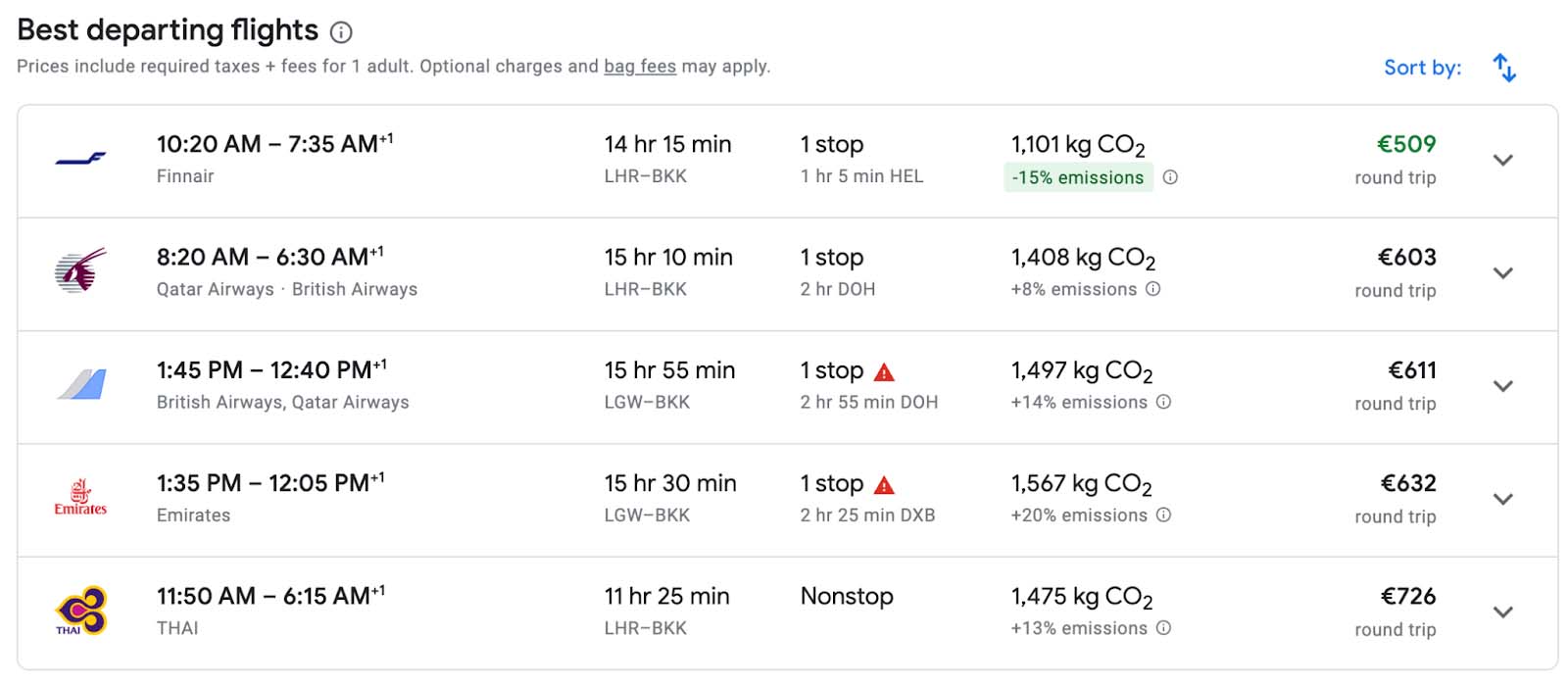I have to admit that I’ve sometimes struggled with the idea that I’m travelling all around the world while inevitably having a major environmental impact. Flying, in particular, has so been often called out for its significant carbon emissions.
It’s undeniable that the tourism industry has a huge environmental impact. Tourism is said to be responsible for around 8% of global carbon emissions, while also having other potential negative environmental and social impacts.
So what is a traveller to do?
Well, here’s how I see it. The world is undergoing a massive process of switching over to cleaner ways of doing things, as can be seen in the exponential uptake of renewable energy. This is a very hopeful trend! Sadly, we’re still stuck with many legacy systems for now — things like fossil-fuel-powered jet engines — so it’s difficult to do everything ‘perfectly’ as an individual. In the meantime, we can still make some changes to our travel habits that can help make our trips a lot more sustainable.
The great news is that travelling more sustainably has become a lot easier. By making small changes in how you plan your trips, you can often make a meaningful difference.
1. Choosing cleaner flights
Flights are surely the most talked-about sustainability issue in travel.
Aviation contributes significantly to carbon emissions and this is unlikely to change anytime soon, since cleaner technologies have not yet left the drawing boards.
Not every flight emits the same levels of carbon, however. This means that we, as travellers, can at least choose a less polluting flight.
Luckily it’s become a lot easier to make informed decisions regarding the environmental impact of flights. For instance, try searching with Google Flights, and you will see an estimate of the CO2 emissions for every flight option.

You can also narrow your Google Flights search to display “low emissions only”. (It’s under the ‘Emissions’ button in the flight overview.)
According to Google, these calculations are made using a combination of factors, such as “the distance of a trip, the number of stops, the number and class of seats on board, the type of aircraft and data from the European Environment Agency.”

Direct flights are usually better options as most emissions (relatively speaking) come from take-off and landing. The aircraft type is also a big factor as the more fuel-efficient planes emit less CO2 than old kerosine guzzlers.
Now, I don’t want to stigmatize flying, which I’m not sure is all that helpful. I do it a fair bit myself — and often the only reasonable way to get somewhere is by plane! But taking CO2 emissions into account is one step that can at least minimize the impact.
2. Travelling overland
Let me tell you: it’s INSANE just how much more environmentally friendly overland travel can be.
If you look into it even a bit, the numbers are actually mind-blowing.
Rail travel is particular absolutely destroys when you look at pretty much any sustainability chart. High-speed rail is actually the most efficient form of transport that humanity has come up with… by a lot.
Okay, so I’ve been consuming pretty nerdy material lately. According to *adjusts glasses* the book Energy by Vaclav Smil, a French TGV can move people around using less than 0.4 MJ/p-km (the energy used per passenger per kilometre). This figure is about 2 MJ/p-km for jet airlines.
That’s a whopping five times better, but that’s just talking about the base efficiency. The difference becomes much greater when putting it in terms of carbon emissions.
Here are some stats from ThisWorldInData:
This chart, which is based on UK government data, shows that taking the Eurostar high-speed rail is 42.5 times (!) less carbon-intensive than taking a domestic flight.
That’s NUTS.
This makes me wonder: why are we not talking much more about the sheer miracle of high-speed rail?!
While flying may be the only practical or convenient option for some trips, it’s great news that overland travel options are increasing. In Europe, rail is even undergoing a renaissance of sorts. New high-speed rail and international (overnight) connections are popping up left, right and centre. It is also getting easier to book tickets, though sadly, the prices are still often not competitive with budget airlines.
Even knowing the statistics, I must admit that I’m not exactly 42.5 times more likely to take a train. However, knowing just how efficient trains are makes me even happier to use them wherever possible.
3. Staying in eco-accommodation
Apart from transportation. another way of reducing our impact on the environment is choosing accommodation that cares about water and energy use, waste disposal, food sourcing, and other such aspects.
It’s heartening that increasing numbers of hotels, hostels and eco-lodges are prioritising sustainability.
But how do you find them?

Of course, some accommodations specifically promote themselves as eco-lodges or eco-resorts, or make a big deal about their sustainability focus. But a lot of times, it’s not quite so obvious.
Luckily, there are now search filters you can use.
For example, Booking.com has introduced a sustainability badge for hotels. This badge is based on various measures regarding waste, energy and greenhouse gases, water, supporting local communities and protecting nature. It’s somewhat subtle, but you can see these establishments labelled as a “Travel Sustainable property”.

This label appears among the listings, but you can also search for them using filters:

Issuing the badge is based on self-assessment surveys, so this system may not be completely watertight. However, any property that claims to be sustainable but isn’t would surely suffer bad reviews, so I believe this badge still gives a useful indication.
There are now also several levels of sustainability indicated on Booking, which can motivate a property to improve over time. This might involve installing solar microgrids, solar water heaters, or ensuring that the food for guests is locally sourced.

Google Travel also recently introduced its own eco-certified badge. It’s awarded to hotels that were “certified as environmentally sustainable by an independent organisation recognised by Google”. Hopefully, more travel platforms will follow suit.
While I haven’t used them, there are booking sites specifically for eco-accommodation, such as Nature.house or Ecobnb, which awards 1 to 5 leaves on a range of eco criteria.
4. Supporting ecotourism
Ecotourism is another way you can leave an impact — except of the good kind of impact.
This won’t necessarily negate the overall environmental impact of your trip, but ecotourism does play a crucial role in protecting nature and preserving biodiversity.
Ecotourism is any kind of tourism that benefits the environment and the local people. Safaris are often one of the first things that spring to mind, but there are many other examples. Scuba diving, whale-watching, hiking, rock climbing, and canyoning can all be ecotourism as well (if done responsibly).

Some of my experiences over the past few years brought into focus just how much ecotourism can help communities live from nature rather than from destroying it.
For instance, on a wildlife tour in Cambodia, I got to know some of the park rangers. Many of them had literally been loggers and poachers before the local ecotourism project had started. They were now proud to be making a living protecting nature instead of exploiting it — and it’s tourist money that contributes the largest portion of their salaries.
Now, I know one common criticism is that flying halfway around the world (emitting climate change-causing pollutants) to see some animals doesn’t make much ecological sense. Well… maybe, right now, and viewed quite narrowly.
But I think the idea of ecotourism has much more to do with the long view. It’s about protecting the wilderness and biodiversity we have left so we can enjoy this even after we make our societies more sustainable.
So, if you decide to fly to Costa Rica to see some sloths and monkeys, I think that’s awesome! (By the way, thanks to ecotourism income, the forests in Costa Rica have for a long time been actually growing.)
5. Using electric vehicles
It’s 2023 and there aren’t that many EVs on the road yet, but it’s safe to say that it’s just a matter of time until gas and diesel cars are consigned to the dustbin of technology.
Some still doubt and dispute that electric cars are better for the environment. But while it takes more CO2 emissions (currently) to make a car with batteries and an electric drive, it’s quickly compensated for by their incredible efficiency.
Even if you power an EV using electricity from a dirty coal plant rather than renewable energy, it’s still a big improvement. In a typical petrol car, only about 25% of the fuel energy is actually used to move the car, while the rest is lost as heat. That’s kinda nuts!
EVs don’t have this problem. They also require less maintenance, last much longer, and their batteries are almost completely recyclable at their end of life.
Okay, maybe you’ll struggle to find an EV if you’re travelling in Sri Lanka or Bolivia, but they’re increasingly an option in more developed destinations.

For proof that it’s already possible to travel around the world in electric vehicles, just watch the wonderful series The Long Way Up. In this documentary, Ewan McGregor and Charlie Boorman travel from the southern tip of Argentina to LA using electric motorbikes and electric cars.
6. Reducing waste
And then there are the smaller gestures that can count, too.
Generally using fewer resources and having less negative impact on local communities is always something travellers can strive for. Avoiding long showers, especially in a destination where water is scarce, is a great idea. Using a refillable water bottle is also clearly preferable to using single-use plastic bottles all the time. These containers can quickly add up, particularly in tropical countries where you might go through several bottles a day.
I think the notion of being less wasteful can also be extended to the overall trip. Taking flights for three separate weekend trips is much more wasteful compared to flying somewhere and staying a week.
Slower travel can reduce the overall waste level if you average out your impact across all travel days.
7. Compensating your emissions
Finally, it is possible to offset the CO2 emissions of your trip. Such offsets will pay for, say, having trees planted or solar panels installed. You’ve surely heard of such offsetting initiatives, though they are not without some controversy, as it’s hard to say for sure how effective the offsets are.
Personally, I now feel it may be better to choose companies that have pledged to offset CO2 emissions for every customer across the board rather than leaving it up to the individual to do it.
There are also some more direct ways to compensate for emissions in your own life. It’s already quite easy to choose to eat less meat, choose electricity for your home from renewable sources, or support charities actively working on nature conservation.
When it comes to election time, you can choose to vote for political parties that support strong environmental policies—possibly the best ‘offset’ you can make!
A sustainable future for travel?
All in all, I think just in the past five years, there has been so much progress in sustainability.
Expecting every traveller to be a complete purist when it comes to their travel impact is probably not so realistic. Unless you choose to walk the Earth and never use a vehicle of any kind, it’s hard to do everything 100% sustainably.
However, I do think each traveller making small changes and more mindful choices can have a big impact taken together, which also gives the right kind of signals to companies and governments that have bigger levers to pull.
Everyone can help out by choosing lower-impact forms of travel that are better for the planet, better for the destination and often more fun too!






Hi Marek, Very interesting content, I always think about traveling without pollution, But all my travels are on budget so i need cut cost. some times eco friendly hotels & resorts are very costly, but i will prefer to make such nature friendly travel. Thanks for remember this. many one likes me avoiding such things.